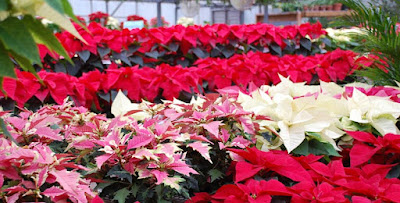 |
| Photo: Kansas State University |
If you have a Poinsettia plant from last year that is still in good condition, you can follow a few tips to get it ready to show its colors for the holiday season.
These colorful plants are from the Euphorbia family of plants which are native to Mexico and can last for several years with proper care. They can’t tolerate freezing temperatures so during the winter months they can be used as houseplants and in the warmer months, can be placed outside out of direct sunlight and used as a patio plant. Once the summer season is ending, you can refresh your plant by repotting it and bring it inside to prepare it for the colder months indoors.
 |
| Bracts are the leaves of poinsettia that change color depending on light exposure. Photo: University of Minnesota Extension |
What are often called the petals of these plants are actually bracts which are colorful characteristic leaves. Poinsettias are often known for their brilliant red bracts, but due to creative breeding many color variations and patterns can now be found.
In order to have your poinsettia “rebloom” for the holidays, you must give them a period of darkness. According to the Colorado State Extension bulletin 7-412 the following steps are recommended “Starting about October 1, it also needs at least 14 hours of uninterrupted darkness each night at temperatures between 60 and 70F. Stray light of any kind (street lights, pool lights or lamps) could delay or entirely halt the reflowering process. The dark treatment should last until color shows in the bracts (approximately Thanksgiving). Some modern cultivars may show color as much as two weeks before Thanksgiving. Continue fertilizing and watering to encourage good growth.” You should use a wastebasket or box that fits over the plant to ensure that it is blocking the light properly.
Refer to the publications below to learn more about poinsettias and to help guide you through the care of your plant.
Colorado State University: CSU-Poinsettia-Fact-Sheet-7-412
Penn State Extension: Choosing and Caring for your Poinsettia
University of Minnesota Extension: Growing and Caring for the Poinsettia





